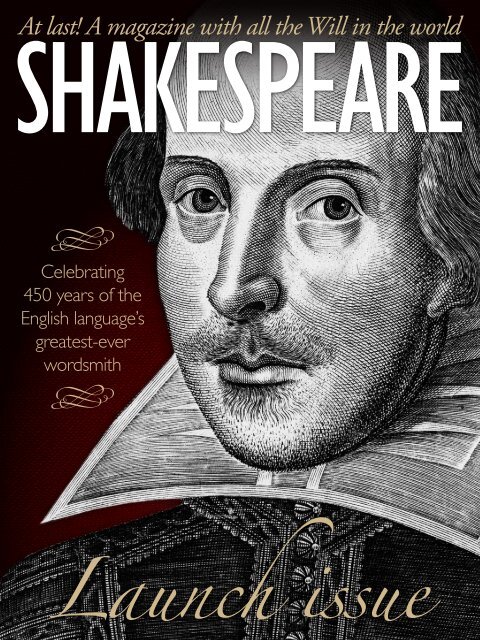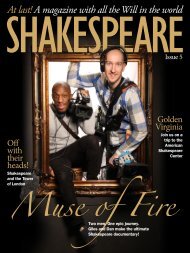Shakespeare Magazine 01
Originally launched on the day that marked the 450th anniversary of William Shakespeare's birth, Shakespeare Magazine is a completely free online magazine for anyone interested in the English language's greatest-ever wordsmith.
Originally launched on the day that marked the 450th anniversary of William Shakespeare's birth, Shakespeare Magazine is a completely free online magazine for anyone interested in the English language's greatest-ever wordsmith.
Create successful ePaper yourself
Turn your PDF publications into a flip-book with our unique Google optimized e-Paper software.
At last! A magazine with all the Will in the world<br />
SHAKESPEARE<br />
<br />
Celebrating<br />
450 years of the<br />
English language’s<br />
greatest-ever<br />
wordsmith<br />
<br />
Launch issue
Welcome <br />
Welcome<br />
Photo: David Hammonds<br />
to the first issue of <strong>Shakespeare</strong> <strong>Magazine</strong><br />
Back in my teenage years, I was a bit of a <strong>Shakespeare</strong><br />
fan. Doing an English degree at Oxford, however,<br />
was enough to firmly put me off literature for more<br />
than two decades. But I could never quite shake<br />
off my fascination for <strong>Shakespeare</strong>, and last year I<br />
found myself attempting for the first time to read the<br />
Complete Works.<br />
It was a defining, exhilarating, life-changing experience, one which<br />
also felt like a personal achievement – similar, I’d imagine, to climbing<br />
a mountain or running your first marathon.<br />
As a journalist, I instinctively looked for a magazine to enhance<br />
my rekindled love of the Bard. And I was stunned to discover that<br />
there wasn’t one.<br />
So 12 months later, here I am with the very first issue of<br />
<strong>Shakespeare</strong> <strong>Magazine</strong>, built from scratch by myself and Art Editor<br />
Paul McIntyre, along with a team of contributors who have been<br />
amazingly generous with their time and talent.<br />
<strong>Shakespeare</strong> <strong>Magazine</strong> is free to absolutely anyone in the world<br />
– although it would certainly help if you understand English, have<br />
internet access and are interested in <strong>Shakespeare</strong>.<br />
I’m thrilled to be launching <strong>Shakespeare</strong> <strong>Magazine</strong> in the week we<br />
celebrate 450 years since the birth of the man himself. It’s yet another<br />
testament to the enduring power and magic of his words.<br />
I hasten to add that I’m absolutely not a <strong>Shakespeare</strong> expert or<br />
any kind of authority. I’m just a humble journalist embarking on a<br />
journey with <strong>Shakespeare</strong>. And you’re very warmly invited to join me.<br />
Enjoy your magazine.<br />
Pat Reid, Founder & Editor<br />
SHAKESPEARE magazine 3
At last! A magazine with all the Will in the world<br />
SHAKESPEARE<br />
<br />
Celebrating<br />
450 years of the<br />
English language’s<br />
greatest-ever<br />
wordsmith<br />
<br />
Contents<br />
Launch issue<br />
<strong>Shakespeare</strong> <strong>Magazine</strong><br />
Issue One<br />
23 April 2<strong>01</strong>4<br />
Founder & Editor<br />
Pat Reid<br />
Art Editor<br />
Paul McIntyre<br />
Advertising Manager<br />
Helen Forsyth<br />
Writers<br />
Robin Askew<br />
Zoe Bramley<br />
Andrew Bretz<br />
Koel Chatterjee<br />
Emma Gutteridge<br />
Lisa Houston<br />
Naomi Lord<br />
Kate Madison<br />
Samantha Mann<br />
Helen Mears<br />
Tom Phillips<br />
Brooke Thomas<br />
Daniela Verdejo<br />
Photography<br />
David Hammonds<br />
Gavin Roberts<br />
Ceramic Art<br />
Hannah Tribe<br />
Cover<br />
Engraving by Martin Droeshout,<br />
1623<br />
Thank You<br />
Richard Forsyth<br />
Guy Radcliffe<br />
Laura Pachkowski<br />
Mrs Mary Reid<br />
Thomas Xavier Reid<br />
Contact Us<br />
shakespearemag@outlook.com<br />
Twitter<br />
@UK<strong>Shakespeare</strong><br />
Coming Soon<br />
www.shakespearemagazine.com<br />
Game of crowns 10<br />
How Hollow Crown Fans made <strong>Shakespeare</strong> a Twitter phenomenon.<br />
<strong>Shakespeare</strong><br />
news 6<br />
What’s shaking in the world of<br />
<strong>Shakespeare</strong>.<br />
<br />
<br />
Exclusive<br />
competition 19<br />
This unique and beautiful<br />
handcrafted <strong>Shakespeare</strong> swan<br />
is up for grabs.<br />
<br />
4 SHAKESPEARE magazine
Contents <br />
Once upon a time<br />
in the west 20<br />
How Bristol became a hotbed of<br />
<br />
<br />
Slaughtering<br />
<strong>Shakespeare</strong> 28<br />
Jessica Lange, Anthony Hopkins<br />
and the most shocking <strong>Shakespeare</strong><br />
<br />
<br />
Beyond the<br />
bloodbath 32<br />
<br />
of Titus Andronicus.<br />
<br />
Bollywood<br />
shakes! 34<br />
The century-long romance of<br />
<br />
William <strong>Shakespeare</strong>.<br />
<br />
All the world’s<br />
a... screen 38<br />
<strong>Shakespeare</strong> authority<br />
<br />
<br />
<br />
Around the<br />
Globe in a day 42<br />
All in a day’s work at<br />
<strong>Shakespeare</strong>’s Globe.<br />
<br />
SHAKESPEARE magazine 5
News<br />
SHAKESPEARE<br />
N ews<br />
“All the world’s a stage / And all the men and women merely players”<br />
OPENING SCENE<br />
Oh, Verona!<br />
The Arena di Verona Opera Festival: clearly the place<br />
to be for opera buffs with a taste for <strong>Shakespeare</strong>.<br />
Running from 20 June to 7 September,<br />
the Festival’s highlights include<br />
productions of Carmen, Turandot<br />
and <br />
Romeo<br />
and Juliet<br />
<br />
Roméo et Juliette is staged, with<br />
<br />
<br />
Tickets from www.arena.it or email<br />
biglietteria@arenadiverona.it<br />
6 SHAKESPEARE magazine
News <br />
Strike a Pose<br />
Bolton school's stylish R&J is<br />
inspired by Madonna's 'Vogue'.<br />
Last month, Bolton School staged<br />
Romeo and<br />
Juliet with Zack Howarth and<br />
<br />
<br />
<br />
the concept of the battling houses of<br />
Montague and Capulet.<br />
Next up for the school’s <strong>Shakespeare</strong><br />
450 celebrations is a festival presenting<br />
<br />
out too for an unpcoming production<br />
of Christopher Marlowe’s Dr. Faustus,<br />
<br />
<br />
www.boltonschool.org<br />
Twitter @drama_bsbd<br />
<br />
<br />
<br />
The Day The Globe Caught Fire<br />
Dancer Roberto<br />
Bolle returns to the<br />
<br />
City of London Tour Guide<br />
Zoe Bramley reports from the<br />
<strong>Shakespeare</strong> Trail.<br />
The first Globe theatre was situated<br />
a few hundred yards from today’s<br />
replica and was built in 1599. There’s<br />
some disagreement as to which play was<br />
first performed there – Henry V? Julius<br />
Caesar? But we know for sure which play was<br />
performed on the day it burned down.<br />
It was 29 June 1616. Inside the<br />
Globe, the groundlings – or “penny<br />
stinkards” – stood blinking in the afternoon<br />
sun, enthralled by the action on stage. The<br />
King’s Men were performing Henry VIII,<br />
<strong>Shakespeare</strong>’s latest, and the house was packed.<br />
As the play progressed, and Henry VIII<br />
entered Cardinal Wolsey’s house, a cannon<br />
was fired in honour of the legendary king.<br />
So thrilling was the spectacle that no-one<br />
noticed a stray spark land in the thatched<br />
roof. And when it began to smoulder, it was<br />
thought “but an idle smoak.” According to<br />
our eye witness Henry Wotton, the audience<br />
had “eyes more attentive to the show”, so “it<br />
kindled inwardly and ran around like a train,<br />
consuming within less than an hour the whole<br />
house to the very ground.”<br />
Happily, the only thing hurt was one<br />
man’s pride when his breeches caught fire and<br />
had to be extinguished with a bottle<br />
of beer.<br />
In 1989, the site of the Globe was explored<br />
by archaeologists from the Museum of London<br />
who discovered signs of charring above the<br />
foundations. Fire was an everyday hazard in<br />
the 17th Century, and thatched roofs were<br />
finally banned after the Great Fire of 1666<br />
which devoured the medieval city. Today’s<br />
Globe theatre is the first London building to be<br />
permitted a thatched roof since then.<br />
Twitter: @shakespearewalk<br />
SHAKESPEARE magazine 7
News<br />
Back to school<br />
with <strong>Shakespeare</strong><br />
Inspired by the RSC’s ‘Stand up for <strong>Shakespeare</strong>’<br />
approach, teacher Helen Mears shares her essential<br />
Dos and Don’ts for teaching the Bard.<br />
DON’T speak about <strong>Shakespeare</strong><br />
in hushed, reverent tones. He was<br />
a merchant’s son from small-town<br />
Stratford-upon-Avon. He didn’t go<br />
to university. He was educated by<br />
the English grammar school system.<br />
He was of the people and he is for<br />
the people.<br />
DON’T let your students be afraid<br />
of the language. Ninety-five percent<br />
of the words <strong>Shakespeare</strong> used are<br />
still in use today. The rest can be<br />
looked up in a good glossary or else<br />
gleaned from speaking them and<br />
looking at them in context.<br />
DON’T be afraid that you can<br />
introduce <strong>Shakespeare</strong> too early.<br />
Young children are used to archaicsounding<br />
language in the form of<br />
nursery rhymes and fairy tales. They<br />
will enjoy the rhythm and rhyme,<br />
particularly that of the faeries and<br />
witches in the plays.<br />
DON’T simply sit at the desks and<br />
read. The language is there to be<br />
explored. Look at punctuation, prose<br />
and verse, variations in the iambic<br />
rhythm. Think about where they are<br />
used and why. What do they tell us<br />
about the characters?<br />
DON’T say “I know this is boring but<br />
we have to”. Talk about Elizabethan<br />
England – the plague, bear-baiting,<br />
castles, stately homes. Tell them about<br />
the Reformation and the power<br />
of kings and queens. Explain why<br />
<strong>Shakespeare</strong> had to be so careful about<br />
what he wrote.<br />
DO see the play – a live production,<br />
recorded, film or television – however<br />
you can. Avoid those hammy Olivierera<br />
films. Received pronunciation<br />
didn’t exist in <strong>Shakespeare</strong>’s England<br />
and William himself would have<br />
spoken with a broad regional accent.<br />
Remember, he’s for everyone.<br />
DO ensure your students know and<br />
understand the story of the play they<br />
are studying. Show them the whole<br />
story and get them to summarise it as<br />
a tweet, a fairy story, a rap. Then you<br />
can begin to work on smaller, edited<br />
extracts of the text.<br />
DO move away from the desks.<br />
<strong>Shakespeare</strong>’s works are play texts,<br />
so treat them as plays. Say the words<br />
aloud, start in groups and select key<br />
words from the speech or scene, and<br />
use gesture to reinforce the meaning of<br />
those words.<br />
DO get to know the characters<br />
really well. Play ranking and sorting<br />
games – who is the most important,<br />
the least? Make character Facebook<br />
pages, explore their relationships,<br />
emotions and motivations.<br />
Characters are the heart and soul of<br />
every <strong>Shakespeare</strong> play.<br />
DO let your students find their own<br />
meanings. It doesn’t matter what crusty<br />
old critics have said, how do the plays<br />
resonate today? Explore the universal<br />
themes that drive the plays – love, hate,<br />
revenge, friendship, ambition. Ask your<br />
students what would they do in the<br />
same situation?<br />
<br />
www.rsc.org.uk/sufs/<br />
The <strong>Shakespeare</strong> <strong>Magazine</strong> Quiz<br />
To celebrate the Bard's 450th birthday, our debut quiz is inspired<br />
by the “uncertain glory” of the month of April itself...<br />
1<strong>Shakespeare</strong>’s<br />
birthdate is<br />
unknown, but thought<br />
to be 23 April. On<br />
<br />
<br />
christened at Stratford-<br />
<br />
<br />
2 <br />
<strong>Shakespeare</strong> also<br />
died on 23 April – in<br />
<br />
<br />
<br />
“Blessed be the man<br />
that spares these<br />
stones…”<br />
3In his will,<br />
<strong>Shakespeare</strong><br />
<br />
“second-best bed”<br />
to his wife Anne. The<br />
document is also<br />
famous for containing<br />
three of the existing six<br />
<br />
4From which<br />
<strong>Shakespeare</strong><br />
<br />
character, does this<br />
<br />
“O, how this spring of<br />
love resembleth / The<br />
<br />
<br />
5<strong>Shakespeare</strong>’s<br />
<br />
<br />
<br />
<br />
his troops with these<br />
<br />
<br />
<br />
Answers: 1) 26 April, 2) “And curst be he that moves my bones”, 3) <strong>Shakespeare</strong>’s signature, 4) The Two Gentlemen of Verona (Proteus, Act 1, Scene 3), 5) Harfleur<br />
8 SHAKESPEARE magazine
News <br />
A dressing<br />
room revelation<br />
for the cast<br />
(Lili Fuller and<br />
Joe Sofranco,<br />
far right).<br />
Pauline (Lili<br />
Fuller) channels<br />
<br />
Works in Progress<br />
Hot new US show Complete<br />
Works could do for <strong>Shakespeare</strong><br />
what Pitch Perfect did for acapella.<br />
Back in 2004, Joe Sofranco beat 16,000<br />
competitors to win the National <strong>Shakespeare</strong><br />
Competition in New York. Ten years later,<br />
he has a company named Kingdom For a Horse<br />
Productions and he’s the writer, co-director and star<br />
of Complete Works, a <strong>Shakespeare</strong>-themed comedy<br />
launching on the Bard’s 450th birthday.<br />
Joe plays an aspiring, <strong>Shakespeare</strong>-obsessed actor<br />
named Hal, who sounds suspiciously like a younger<br />
version of himself. Three years in the making,<br />
the show is set in the surprisingly cut-throat<br />
world of theatre geeks and collegiate <strong>Shakespeare</strong><br />
competitions.<br />
“This was such a labour of love,” says Executive<br />
Producer Lili Fuller, who also plays the character of<br />
Pauline. “It stemmed from our shared passion for<br />
theatre and <strong>Shakespeare</strong>. The three of us are theatre<br />
geeks, and our community is full of crazy, hilarious<br />
people.”<br />
With shades of Mean Girls and Pitch Perfect<br />
– not to mention cult mockumentary Waiting for<br />
Guffman – Complete Works just might be the TV<br />
comedy the Bard's fans have been waiting for.<br />
Complete Works is screening at<br />
hulu.com/complete-works<br />
SHAKESPEARE magazine 9
The Hollow Crown<br />
British acting<br />
heavyweight<br />
Jeremy Irons<br />
as Henry IV.<br />
Game<br />
of<br />
Crowns<br />
10 SHAKESPEARE magazine
The Hollow Crown <br />
“<strong>Shakespeare</strong> is for everyone, no<br />
matter your age, native language<br />
or level of education. We try to<br />
show that <strong>Shakespeare</strong> can be a<br />
part of pop culture”<br />
Hollow Crown Fans<br />
Twitter phenomenon<br />
Hollow Crown Fans<br />
launched the hugely<br />
popular <strong>Shakespeare</strong><br />
Sunday onto a Bardhungry<br />
internet. We<br />
tracked down founders<br />
Lis and Rose for an<br />
illuminating chat about all<br />
things <strong>Shakespeare</strong>...<br />
<br />
SHAKESPEARE magazine 11
The Hollow Crown<br />
ith disarming modesty, Lis and Rose of Hollow<br />
Crown Fans describe themselves as “two admins<br />
who are both <strong>Shakespeare</strong> enthusiasts”. They’re a<br />
transatlantic duo – Rose is from the UK, while Lis<br />
hails from the USA. They first met on Twitter during<br />
“the infamous Wimbledon delay” of 7 July 2<strong>01</strong>2.<br />
This was the occasion when the BBC’s broadcast of<br />
The Hollow Crown: Henry IV Part 1 was held up<br />
by the trifling matter of a sporting event in London<br />
SW19. “If it hadn’t been for tennis,” they say, “we<br />
may have never met.” Rose also had a personal stake<br />
in The Hollow Crown, having appeared as an extra<br />
in THC: Henry V, which starred Tom Hiddleston:<br />
“So you could say we were very early adopters of<br />
the series...”<br />
Joe Armstrong as<br />
Hotspur in Henry IV<br />
Part 1.<br />
12 SHAKESPEARE magazine
The Hollow Crown <br />
Ben Whishaw as the<br />
divinely decadent<br />
Richard II.<br />
How did you get interested in<br />
<strong>Shakespeare</strong>?<br />
Lis: “I come from a family that really values<br />
and appreciates poetry so <strong>Shakespeare</strong> was<br />
introduced early on. I fell in love with<br />
Sonnet 30 as young teenager and began<br />
to explore the rest of his work. I became<br />
interested in <strong>Shakespeare</strong> in its theatre form<br />
after seeing Ralph Fiennes play Hamlet on<br />
Broadway. That made a huge impression on<br />
me and I was forever drawn to <strong>Shakespeare</strong><br />
productions on screen and stage thereafter.”<br />
Rose: “I’ve had an interest in <strong>Shakespeare</strong><br />
from a very early age thanks to my parents<br />
and the BBC’s fantastic animated tales series<br />
(1992). I think what really made me fall in<br />
love with the language was studying Romeo<br />
and Juliet in school during the same year Baz<br />
Luhrmann’s film was released, 1996. It all<br />
seemed to click!”<br />
<br />
about The Hollow Crown?<br />
Lis: “I love the History plays and was<br />
keenly interested in new adaptations of<br />
them, especially given the dream cast across<br />
the tetralogy. Richard II in particular came<br />
“We have young students<br />
following us and top<br />
academics, actors, producers,<br />
media professionals, and top<br />
<strong>Shakespeare</strong> institutions”<br />
Hollow Crown Fans<br />
alive in a way the text never did for me upon<br />
reading. That’s when I realised how powerful<br />
<strong>Shakespeare</strong> could be, even with the perceived<br />
limitations of television. I’d been used to<br />
seeing <strong>Shakespeare</strong> on Broadway and in<br />
regional theatre and big films like Kenneth<br />
Branagh’s Henry V. The quality of these epic<br />
productions for the small screen drew me in.”<br />
Rose: “I was lucky enough to have been cast<br />
as an extra in The Hollow Crown: Henry V.<br />
I love <strong>Shakespeare</strong> and history, but it was the<br />
mention of Tom Hiddleston that gave me<br />
courage to take the plunge and give it a go.<br />
“As a result I was already physically and<br />
emotionally invested in the series from<br />
as early as winter 2<strong>01</strong>1! It was so exciting<br />
following Tom Hiddleston’s tweets from the<br />
battlefield and beyond during the filming<br />
process. Some of the locations I had visited<br />
on holiday or were local to me, which was an<br />
added aspect of interest in seeing this series.<br />
To have been involved, be it a very small part,<br />
is something I shall never forget.<br />
SHAKESPEARE magazine 13
The Hollow Crown<br />
“I love <strong>Shakespeare</strong> and history, but it was the<br />
mention of Tom Hiddleston that gave me courage to<br />
take the plunge and give it a go” Rose<br />
“Before watching THC, I must confess the<br />
history plays never appealed to me, I much<br />
preferred the comedies and tragedies! The<br />
Hollow Crown opened my eyes to these plays<br />
and beyond. The fantastic casting did much to<br />
hook me initially, along with visual feast of the<br />
costumes and film locations used.”<br />
What made you take to Twitter,<br />
and can you describe how your<br />
following grew?<br />
HCF: “We started out to promote a petition<br />
to the BBC to release a commemorative book<br />
of photographs that were taken during the<br />
filming of The Hollow Crown. Initially we<br />
tried to create interesting content so people<br />
would follow us and therefore sign the<br />
petition. Since then our scope has changed<br />
to reinforce our core beliefs that <strong>Shakespeare</strong><br />
is for everyone, no matter your age, native<br />
language or level of education. We try to<br />
show, on a daily basis, that <strong>Shakespeare</strong> can<br />
be a part of pop culture.<br />
“As we’ve introduced art and writing<br />
contests, interactive activities, promoting<br />
news about the cast and <strong>Shakespeare</strong>, and of<br />
course #<strong>Shakespeare</strong>Sunday we’ve steadily<br />
grown in numbers but also in the diversity<br />
14 SHAKESPEARE magazine
The Hollow Crown <br />
Tom Hiddleston as<br />
Henry V (left) and<br />
David Morrissey as<br />
Northumberland<br />
(above).<br />
of our followers. We have young students<br />
following us and top academics, actors,<br />
producers, media professionals, and top<br />
<strong>Shakespeare</strong> institutions. We’re proud of<br />
our diversity but also with how engaged our<br />
followers are with us every day.”<br />
How did you come up with the<br />
idea for the phenomenally popular<br />
#<strong>Shakespeare</strong>Sunday?<br />
HCF: “We loved quoting scenes from The<br />
Hollow Crown and we’d periodically ask<br />
“what’s your favorite quote from...” Then one<br />
Sunday in October 2<strong>01</strong>2, we thought we’d<br />
expand that activity and give the hashtag<br />
#<strong>Shakespeare</strong>Sunday a try and see if people<br />
liked it. The response to it has been nothing<br />
short of incredible.”<br />
Can you share some of your<br />
favourite moments, tweets or<br />
stories from Hollow Crown Fans<br />
around the world?<br />
HCF: “Favourite moments tend to centre<br />
around the activities we’ve done with the<br />
community. We ran an art contest in 2<strong>01</strong>2<br />
and it was amazing to see the work of so<br />
many talented artists coming in. We did a<br />
Cento Poetry competition that was judged<br />
by The <strong>Shakespeare</strong> Institute, and again the<br />
creativity of our followers was inspiring.<br />
“Probably the greatest tweet was from<br />
James Purefoy, who played Mowbray in<br />
Richard II. He had tweeted he was on a<br />
transatlantic flight and so we asked him to<br />
quote some <strong>Shakespeare</strong> from the air and he<br />
responded with one from The Tempest: ‘The<br />
cloud-capp’d tow’rs, the gorgeous palaces, The<br />
solemn temples, the great globe itself...’ which<br />
was simply perfect in context.”<br />
“Undeniably one of our favourite<br />
SHAKESPEARE magazine 15
The Hollow Crown<br />
moments came from a PBS interview Tom<br />
Hiddleston did where he spent time talking<br />
about our account and #<strong>Shakespeare</strong>Sunday.<br />
Getting support from the star of the series, as<br />
well as a prominent television network like<br />
PBS, is a great feeling.”<br />
Was The Hollow Crown<br />
responsible for the rise of<br />
Tom Hiddleston – or was Tom<br />
Hiddleston responsible for the<br />
success of The Hollow Crown?<br />
HCF: “Tom Hiddleston was already making<br />
waves as Loki in the Marvel films, but<br />
perhaps The Hollow Crown showed a mass<br />
audience how adept he is at performing and<br />
leading an audience through <strong>Shakespeare</strong>.<br />
The Hollow Crown had a tremendous cast<br />
of new talent as well as legends – it would<br />
be a mistake to chalk up the success of The<br />
Hollow Crown to any one actor. To be frank,<br />
David Dawson as<br />
Poins (left) with Tom<br />
Hiddleston’s Hal.<br />
<strong>Shakespeare</strong> is what made it successful. We<br />
track mentions on Twitter and <strong>Shakespeare</strong><br />
outruns mentions of any of the actors by 10-<br />
20 times the rate!”<br />
Apart from the obvious big names,<br />
who are some of your favourite<br />
characters and actors from The<br />
Hollow Crown?<br />
Lis: “The supporting actor that really<br />
stood out for me was David Morrissey as<br />
Northumberland in Richard II. I can only<br />
describe him as completely badass. His role<br />
and lines were appropriate for the historical<br />
setting <strong>Shakespeare</strong> wrote for, but David<br />
made the political role modern and fresh with<br />
the right balance of edginess and gravitas.<br />
“As for favourite character, I really enjoyed<br />
how David Dawson brought Poins to life. I<br />
thought he and Tom Hiddleston had great<br />
chemistry together and provided a lot of<br />
levity that stood up well against the wellknown<br />
humour between Hal and Falstaff.<br />
They made me want to head off to Boar’s<br />
Head Tavern for a few cups of sack!”<br />
Rose: “Two names I have to mention<br />
here. Firstly, Edward Akrout – the ‘dashing’<br />
Dauphin in Henry V. He gave a wonderful<br />
performance in a role that was rather edited<br />
down from the original version of the play. I<br />
felt he gave the Dauphin more than just the<br />
‘bad guy’ image one would originally expect<br />
in the role – and by the end might dare to<br />
confess even feeling some sympathy it hadn’t<br />
gone to plan at Agincourt!<br />
“Joe Armstrong as Harry Percy (Hotspur)<br />
in Henry IV Part 1 was another key favourite<br />
character and actor in the series. I had long<br />
been a fan of his father, Alun Armstrong, and<br />
was delighted that they were cast as father and<br />
son in The Hollow Crown!<br />
“Not only did they naturally work<br />
“The supporting actor that really stood out for me was<br />
David Morrissey as Northumberland in Richard II.<br />
I can only describe him as completely badass” Lis<br />
16 SHAKESPEARE magazine
The Hollow Crown <br />
Edward Akrout cuts a dash<br />
as the Dauphin.<br />
brilliantly together, but Joe matched up to the<br />
likes of Jeremy Irons, Tom Hiddleston and<br />
Michelle Dockery fantastically. By the end of<br />
this episode you were half torn with sadness<br />
that the light Joe shone to this character was<br />
extinguished by Prince Hal.”<br />
What are your thoughts on<br />
Hollow Crown 2?<br />
Lis: “I could not be more excited - and<br />
still a bit shocked - that a second series was<br />
announced, as the first series was reportedly<br />
disappointing in ratings. But I’m ecstatic that<br />
once again the BBC will bring lesser-known<br />
plays to the small screen, and ideally find<br />
that balance between making it appealing<br />
to the masses and detailed enough for the<br />
already converted. The casting of Benedict<br />
Cumberbatch in Richard III seems to indicate<br />
that’s the approach they plan to take.”<br />
Rose: “I am still in a complete state of<br />
happiness that there is a second series! We<br />
knew how much the first was loved by people<br />
and, thanks to the internet, how global this<br />
was. But realistically, the viewing figures in<br />
2<strong>01</strong>2 were not as high as we had hoped, let<br />
alone the BBC’s expectations.<br />
“When The White Queen aired on the<br />
BBC earlier this year, we had fun pairing up<br />
quotes from Henry VI and Richard III to<br />
various images, and discussed how much we<br />
wished THC could have had a second series!<br />
“Philippa Gregory’s novels, along with the<br />
recent discovery of Richard III’s body, have<br />
brought this period of history more into the<br />
public eye and shown there is a wide interest<br />
and demand for this material.<br />
“The War of the Roses accompanied with<br />
<strong>Shakespeare</strong> during the 450th anniversary of<br />
his birth seems the perfect combination right<br />
now and we expect only great things from<br />
The Hollow Crown series 2!”<br />
<br />
Find Hollow Crown Fans on Twitter:<br />
@HollowCrownFans<br />
SHAKESPEARE magazine 17
Win <br />
EXCLUSIVE COMPETITION<br />
To celebrate the 450th anniversary of <strong>Shakespeare</strong>’s birth on<br />
23 April 1564, we have commissioned this beautiful and entirely<br />
original ceramic work from artist Hannah Tribe.<br />
Titled ‘Sweet Swan of Avon’, it will make a uniquely perfect<br />
centrepiece to the writing desk of any <strong>Shakespeare</strong> fan.<br />
Photo: David Hammonds<br />
To be in with a chance of winning our lovely swan, simply send an email to<br />
shakespearemag@outlook.com with ‘Swan Comp’ in the subject line.<br />
Don’t forget to include your name, address, postcode and contact number.<br />
We will accept entries from outside the UK, but please be sure to include full<br />
contact details.<br />
The closing date for this competition is Monday 26 May<br />
– and may fortune favour you!<br />
“This sculpture combines references to characters from<br />
<strong>Shakespeare</strong>’s life, both real and imagined”<br />
SHAKESPEARE magazine 19
<strong>Shakespeare</strong> city: Bristol<br />
ONCE UPON A<br />
TIME IN THE WEST<br />
20 SHAKESPEARE magazine
<strong>Shakespeare</strong> city: Bristol <br />
Main image: Clifton<br />
Suspension Bridge is<br />
Bristol’s most iconic<br />
landmark.<br />
Right: <strong>Shakespeare</strong><br />
Inn, Victoria Street.<br />
Local poet and<br />
playwright<br />
Tom Phillips<br />
takes us on a<br />
<strong>Shakespeare</strong>-<br />
<br />
tour of the city<br />
of Bristol.<br />
<br />
SHAKESPEARE magazine 21
<strong>Shakespeare</strong> city: Bristol<br />
“Peter O’Toole’s 1955 performance<br />
as Hamlet at Bristol Old Vic is the<br />
stuff of legend”<br />
Photos: Alan Moore, Gavin Roberts<br />
The <strong>Shakespeare</strong><br />
pub, Redland.<br />
22 SHAKESPEARE magazine
<strong>Shakespeare</strong> city: Bristol <br />
<strong>Shakespeare</strong> at the Tobacco Factory’s 2000<br />
production of King Lear: Roland Oliver as Lear<br />
(below) and Paul Nicholson as the Fool (below, right).<br />
Amuch-loved, but often-overlooked city<br />
in the South-West of England, Bristol<br />
makes no claims to have any particular<br />
connection with the living, breathing<br />
William <strong>Shakespeare</strong>. There are a few<br />
passing mentions of the city in Henry IV pts 1 & 2<br />
and Richard II – mostly in connection with troop<br />
movements and ‘the caterpillars of the commonwealth’<br />
who rebel against the monarchy – but it wasn’t a<br />
particularly prominent feature on <strong>Shakespeare</strong>’s<br />
imaginary map of England.<br />
The playwright’s posthumous presence,<br />
however, looms large. Maybe that’s because,<br />
having passed through Stratford, the river<br />
Avon snakes through the city, runs under<br />
Clifton Suspension Bridge and out to the<br />
Bristol Channel. You might say, in fact, that<br />
the river plugs the city into the <strong>Shakespeare</strong>an<br />
heartland.<br />
A rather less fanciful explanation, perhaps,<br />
is that Bristol has a long and eminent<br />
theatre tradition and, not surprisingly,<br />
productions of <strong>Shakespeare</strong>’s plays have been<br />
a prominent part of that. Peter O’Toole’s<br />
1955 performance as Hamlet at Bristol Old<br />
Vic is the stuff of legend while the same<br />
theatre’s 1997 production of Macbeth with<br />
Pete Postlethwaite as the eponymous Scottish<br />
king saw the professional stage debut of one<br />
Chiwetel Ejiofor (as Malcolm).<br />
More recently, the city has also gained an<br />
annual Bristol <strong>Shakespeare</strong> Festival – with<br />
many a production staged outdoors or in<br />
unlikely venues – and the simultaneously<br />
acclaimed and popular <strong>Shakespeare</strong> at the<br />
Tobacco Factory.<br />
The brainchild of Bristol-based director<br />
Andrew Hilton, the latter began life a few<br />
weeks after the millennium, when it opened<br />
with King Lear. On the face of it, it was<br />
absurdly ambitious: a full-cast production of<br />
the bleakest tragedy staged in a rough-andready<br />
space on the first floor of a stripped-out<br />
factory building in what was then a fairly<br />
rundown part of south Bristol.<br />
On press night, not more than a dozen<br />
people showed up. Only two of us were<br />
journalists. Of the rest, at least three or more<br />
members of the audience appeared to have<br />
wandered into the place by accident and had<br />
only stayed because it was marginally warmer<br />
than the street outside. We spread ourselves<br />
out in the auditorium in a desperate attempt<br />
SHAKESPEARE magazine 23
<strong>Shakespeare</strong> city: Bristol<br />
to make it look full. Then the play started.<br />
From the outset, it was obvious that this<br />
was no ordinary production. Lines which had<br />
been dunned into me in A-level English until<br />
they’d lost all their poetry were leaping off<br />
the page as if nobody had ever spoken them<br />
before.<br />
Even relatively minor characters were<br />
emerging as fully rounded individuals with a<br />
life which went way beyond their usefulness<br />
as plot devices. Without a hint of gimmickry,<br />
without any attempt to be trendily cutting<br />
edge by, say, relocating the entire play to a<br />
supermarket in war-torn Bosnia, this was a<br />
production which put its trust in the text and<br />
mined it for every nuance, every ambiguity.<br />
The result was extraordinary. By the time<br />
Lear was railing against Cordelia’s ingratitude,<br />
even the people who’d not really meant to<br />
come and see a <strong>Shakespeare</strong> play at all were<br />
sitting bolt upright. By the time of the king’s<br />
expulsion onto the heath, they were on the<br />
edge of their seats. Even the sword fight<br />
between Edgar and Edmund looked as if it<br />
might go either way.<br />
That same week, apparently, Hilton<br />
Great British<br />
<strong>Shakespeare</strong><br />
venue: Tobacco<br />
Factory.<br />
“Even the sword fight between Edgar and<br />
Edmund looked as if it might go either way”<br />
considered pulling the plug on the whole<br />
venture. The company was operating on the<br />
narrowest of margins and ticket sales were<br />
appalling. It seemed that Bristol didn’t have<br />
an appetite for yet more <strong>Shakespeare</strong> after all.<br />
Thankfully, he didn’t – because, as word<br />
began to spread and reviews began to appear,<br />
the city woke up to the fact that something<br />
unique was going on and by the last week of<br />
the month-long run you couldn’t get a ticket<br />
for love nor money. The production of A<br />
Midsummer Night’s Dream which followed<br />
ploughed the same back-to-basics furrow and<br />
fared equally well.<br />
More than aware that too early an<br />
exposure to <strong>Shakespeare</strong> can lead to a lifelong<br />
aversion, I took my six-year-old daughter to<br />
see it. She spent most of the in-the-round<br />
performance lying full-length on the very<br />
edge of the ‘stage’, enthralled by the antics of<br />
Puck, Bottom, Helena and Hermia. While<br />
we were walking home, she announced that<br />
she wanted to be an actress. Fifteen years<br />
later, she’s about to graduate with a degree in<br />
performing arts.<br />
<strong>Shakespeare</strong> at the Tobacco Factory,<br />
meanwhile, have gone from strength to<br />
strength. Aside from an ill-fated production<br />
of Titus Andronicus which nearly bankrupted<br />
the company, they’ve enjoyed unparalleled<br />
success, earned themselves a reputation as<br />
a sort of West Country-based RSC and<br />
given dozens of young actors a leg-up in the<br />
perilous early stages of their career, most<br />
recently with their second take on As You<br />
Like It. What’s more, while they might not<br />
have kickstarted the regeneration of south<br />
Bristol, their popularity hasn’t done anything<br />
to harm it.<br />
Exactly how finely honed productions of<br />
<strong>Shakespeare</strong> might benefit a neighbourhood’s<br />
local economy is a question that’s yet to<br />
be answered, but it certainly feels as if<br />
there’s some kind of connection between<br />
renegotiating Hamlet’s soliloquies and the<br />
24 SHAKESPEARE magazine
<strong>Shakespeare</strong> city: Bristol <br />
“The city’s longest-running pub is, of course, called<br />
The <strong>Shakespeare</strong> Tavern, having opened in 1777”<br />
reinvigoration of the local high street.<br />
Walk down Prince Street towards Bristol<br />
docks, meanwhile, and you’ll come across the<br />
city’s longest-running pub. It is, of course,<br />
called The <strong>Shakespeare</strong> Tavern and, having<br />
opened in 1777, it reputedly took its name<br />
because <strong>Shakespeare</strong> was very much on the<br />
menu at the nearby Theatre Royal (i.e. Bristol<br />
Old Vic). In here, last summer, you might<br />
have encountered an ad-hoc pub performance<br />
for Bristol <strong>Shakespeare</strong> Festival. Over the bar,<br />
you might also have noticed a quotation from<br />
Merry Wives of Windsor.<br />
In here too you might also have spotted<br />
someone sitting at a long wooden table with<br />
a copy of the Sonnets open beside his pint<br />
of Guinness. That was me preparing for<br />
another typically quirky BSF performance:<br />
<strong>Shakespeare</strong> Sonnet Russian Roulette, in<br />
which audience members shout out numbers<br />
from one to 154 and I do sight-read requests.<br />
I don’t think I’ve ever been more terrified<br />
in my life, but it’s a mark of the poetry’s<br />
greatness that its meaning is there, ready and<br />
waiting – no matter who reads it. All you<br />
have to do is look.<br />
<br />
Roland Oliver<br />
as Bottom in A<br />
Midsummer Night’s<br />
Dream (Tobacco<br />
Factory, 2000).<br />
Could you write a <strong>Shakespeare</strong> Guide to your<br />
favourite city? Get in touch:<br />
shakespearemag@outlook.com<br />
<strong>Shakespeare</strong> Tavern,<br />
Prince Street.<br />
SHAKESPEARE magazine 25
Titus Andronicus<br />
Saturninus<br />
(Alan Cumming)<br />
oversees his evil<br />
empire in Titus.<br />
28 SHAKESPEARE magazine
Titus Andronicus <br />
She wound up doing The Lion King and Spider-Man on Broadway. But 15 years<br />
<br />
<strong>Shakespeare</strong>’s Titus Andronicus. Here’s what Robin Askew reckoned at the time...<br />
Titus (18)<br />
USA 1999 /162 minutes<br />
Director: Julie Taymor<br />
Cast: Anthony Hopkins, Jessica Lange,<br />
Alan Cumming, Harry Lennix, Colm Feore,<br />
Jonathan Rhys Meyers, Angus Macfadyen,<br />
Laura Fraser<br />
It’ll be too baroque, violent<br />
and – whisper it! – funny<br />
for those who prefer their<br />
<strong>Shakespeare</strong> luvvie-cosy,<br />
but Julie Taymor’s brave,<br />
visually stunning re-imagining of<br />
this little-known vengeance yarn<br />
is an absolute vindication of her<br />
contention that it’s an overlooked<br />
masterpiece brimming with<br />
contemporary resonance – and a<br />
real treat for those who prefer the<br />
Bard’s earlier, gorier ones.<br />
Much has been written about the way<br />
our appreciation of <strong>Shakespeare</strong> in general,<br />
and Titus Andronicus in particular, is viewed<br />
through the prism of Victorian criticism, with<br />
all its attendant moral baggage. The brilliance<br />
of Taymor’s version is that it recaptures the<br />
spirit of old Bill’s biggest crowd-pleaser,<br />
which entails the increasingly unpleasant<br />
deaths of virtually all of its principals in a<br />
cycle of vengeance that redeems nobody, with<br />
an ugly side-order of sexual abuse, racism and<br />
religiously inspired atrocity.<br />
<br />
SHAKESPEARE magazine 29
Titus Andronicus<br />
How<br />
Bull-headed and<br />
borderline insane:<br />
Anthony Hopkins<br />
as Titus.<br />
much more modern relevance do you<br />
want? Anthony Hopkins, on top form, is<br />
the eponymous granite-hewn, bull-headed<br />
warrior who returns to Rome in triumph after<br />
an extended bout of blood-letting, bearing<br />
Tamora, Queen of the Goths (Lange), her<br />
three sons and “barbarous Moor” Aaron<br />
(Lennix) as his prisoners.<br />
Religious tradition requires a sacrifice, so<br />
the eldest son gets to be torn limb from limb,<br />
his giblets sizzled over an open fire, earning<br />
Titus the undying enmity of the warrior<br />
queen. But his first mistake is in pledging<br />
fealty to weak and effete new emperor<br />
Saturninus (Cumming), who promptly falls<br />
for the exotic and cunning Tamora, giving her<br />
a position of power from which to unleash<br />
the tit-for-tat revenge that will continue until<br />
the climactic time-slice freeze-frame.<br />
Taymor performs wonders in conjuring<br />
such a sumptuous visual feast on a relatively<br />
“<strong>Shakespeare</strong> had a keen appreciation of comic horror<br />
long before the era of The Evil Dead”<br />
30 SHAKESPEARE magazine
“Old Bill’s biggest crowd-pleaser entails the<br />
increasingly unpleasant deaths of virtually<br />
all of its principals”<br />
Titus Andronicus <br />
“Exotic and cunning”<br />
Tamora, played with<br />
sadistic relish by<br />
Jessica Lange.<br />
low budget. From the tremendous, superbly<br />
choreographed opening tableau of an army<br />
of warriors performing a victory ritual in the<br />
Coliseum, the film mixes and matches the<br />
iconography of Ancient Rome, ’30s Italian<br />
fascism and beyond, with every aspect of<br />
the production design and music carefully<br />
thought through, demanding repeated<br />
viewing to appreciate its myriad subtleties.<br />
The violence which is so central to the<br />
story is also explicit only when necessary.<br />
No censor would risk the ridicule of cutting<br />
<strong>Shakespeare</strong>, but nor can one imagine them<br />
permitting the gleeful rape and mutilation<br />
endured by Titus’s virginal daughter Lavinia<br />
in any other film.<br />
Taymor shows us only what we need to<br />
see, but it’s no less horrific for that. Better yet,<br />
she restores the play’s oft-excised funny lines,<br />
which reveal that <strong>Shakespeare</strong> had a keen<br />
appreciation of comic horror long before the<br />
era of The Evil Dead.<br />
The performances are uniformly<br />
magnificent, many of the characters<br />
prefiguring in unvarnished form the Bard’s<br />
more famous creations (Titus/Lear, Tamora/<br />
Lady Macbeth, Aaron/Iago), with Harry<br />
Lennix’s unrepentant Aaron – <strong>Shakespeare</strong>’s<br />
most overt treatment of race, fact fans –<br />
almost stealing it from Hopkins’ borderline<br />
insane Titus.<br />
<br />
This review originally appeared in<br />
Venue <strong>Magazine</strong>.<br />
SHAKESPEARE magazine 31
Titus Andronicus<br />
Beyond<br />
the<br />
bloodbath<br />
Traditionally viewed as the<br />
ultimate victim, Lavinia is the<br />
Titus Andronicus,<br />
writes Emma Gutteridge.<br />
S<br />
2<br />
hakespeare’s earliest and bloodiest tragedy, Titus<br />
Andronicus boasts a dizzying body count. With<br />
14 deaths by the final curtain, not even Hamlet<br />
(nine deaths) and King Lear (ten) come close. But<br />
the deaths themselves aren’t the most shocking<br />
component of this still-disturbing play.<br />
In the second act, Lavinia, daughter of Titus, is brutally raped by<br />
Chiron and Demetrius, sons of the vengeful Queen Tamora. Worse<br />
still, to prevent her from revealing their identities, the brothers viciously<br />
cut out Lavinia’s tongue and hack off her hands. If you have a strong<br />
stomach, try a Google image search for ‘Lavinia in Titus Andronicus’<br />
and then stare open-mouthed at the ensuing gallery of horrors. But<br />
Lavinia is more than a mere emblem of victimhood. Her mutilated,<br />
blood-drenched body conceals astonishing reserves of strength. Lavinia<br />
is, in fact, the nearest thing to a hero in Titus Andronicus...<br />
32 SHAKESPEARE magazine
Titus Andronicus <br />
She’s a rebel<br />
Status-conscious Titus elects 1Saturninus<br />
as Emperor of Rome, giving him both his<br />
daughter and his war prisoners to show<br />
support. But seemingly subservient Lavinia<br />
scuppers his plan by eloping with Bassianus,<br />
the man she truly loves. Lavinia’s defiant act<br />
of rebellion has calamitous consequences. Her<br />
father’s reputation is damaged, as is his trust<br />
in her. Her actions also inadvertently cause<br />
the death of her brother Mutius, a fate which<br />
could have been avoided. And Saturninus,<br />
denied the chance to marry Lavinia, falls<br />
for Tamora instead, providing Rome’s new<br />
Empress with enough power to destroy the<br />
Andronicus family.<br />
She takes on Tamora<br />
Before her brutal silencing, Lavinia is vocal<br />
in insulting Saturninus or confirming her<br />
love for Bassianus. But the bulk of Lavinia’s<br />
words are expended in a battle of wits with<br />
the formidable Tamora, Queen of the Goths.<br />
Discovering Tamora’s affair with Aaron,<br />
morally righteous Lavinia furiously condemns<br />
the Goth Queen’s adultery. Even after her<br />
husband Bassianus is murdered, Lavinia’s<br />
verbal assault rages unabated. This clearly is<br />
a woman who speaks her mind whatever the<br />
consequences.<br />
She has unbelievable resilience<br />
Until her death in Act 5, Lavinia remains<br />
a near-constant presence on the stage.<br />
Spending three acts dumb and without hands<br />
is, of course, a major challenge 3for any actress<br />
playing the role. In the Royal <strong>Shakespeare</strong><br />
Company’s 2<strong>01</strong>3 production Rose Reynolds<br />
scrounged a mouthful of boiled egg after<br />
Photo: Graham Burke<br />
A blood-drenched<br />
Catherine<br />
Hamilton as<br />
Lavinia (The<br />
Tobacco Factory,<br />
Bristol, 2006)<br />
defiantly crushing it with her stump. “She<br />
innately possesses an inner strength and<br />
power,” Reynolds says.<br />
She never forgets who she is<br />
In one of the play’s most unforgettable scenes,<br />
Lavinia finds 4a way to bring retribution<br />
to the Goth Princes. <strong>Shakespeare</strong> depicts<br />
Lavinia chasing her young nephew who<br />
holds the books she needs to ‘speak’ to her<br />
family. She scrabbles with the pages until<br />
‘The Tale of Philomela’ is open (in fact, the<br />
story her tragedy was based upon). Lavinia’s<br />
desperation to have a ‘voice’ is brilliantly<br />
manifested in the 1985 BBC production,<br />
where Anna Calder-Marshall frantically turns<br />
the pages with her teeth.<br />
She’s the bravest character<br />
in the play<br />
Surviving the physical and mental wounds<br />
of her ordeal, while grieving for her husband<br />
and brothers, Lavinia displays more courage<br />
than any of the play’s male characters.<br />
Ultimately she even brings retribution to<br />
her assailants, Chiron and Demetrius – by<br />
scraping words in sand with a staff held<br />
in her mouth. Lavinia’s 5final moments are<br />
spent in her father’s arms, but their loving<br />
reconciliation is heart-rendingly brief, as Titus<br />
is honour-bound to end his daughter’s life. <br />
Read the full unedited version of this article on<br />
our Facebook page<br />
“Try a Google image search for ‘Lavinia in Titus<br />
Andronicus’ and then stare open-mouthed at the<br />
ensuing gallery of horrors”<br />
SHAKESPEARE magazine 33
Bollywood<br />
Amazingly, the love affair between England’s<br />
greatest wordsmith and the world’s biggest<br />
<br />
<br />
<br />
BOLLYWOOD<br />
SHAKES!<br />
W<br />
hen we think of <strong>Shakespeare</strong><br />
in Bollywood we think of<br />
adaptations such as Angoor<br />
[Grapes] (1982), Qayamat Se<br />
Qayamat Tak [From Doom to<br />
Doom] (1988), Maqbool (2003) and Omkara<br />
(2006). We might add to the list <strong>Shakespeare</strong>-themed<br />
movies such as <strong>Shakespeare</strong> Wallah (1965) or The<br />
Last Lear (2007). The Bard, however, is embedded<br />
in the very dialogue and imagery of Bollywood.<br />
This was true right from its inception due<br />
to the roots of Hindi cinema in the Parsi<br />
theatre tradition which freely borrowed from<br />
European, Persian and Sanskrit sources.<br />
After the 1950s, the Bengali literary tradition<br />
resulted in several faithful translations<br />
and adaptations of <strong>Shakespeare</strong>, which,<br />
in conjunction with the inspiration of<br />
Hollywood <strong>Shakespeare</strong> films, has led to<br />
more complex adaptations of <strong>Shakespeare</strong> in<br />
Bollywood in recent years.<br />
<br />
<br />
Naseeruddin Shah, a veteran Bollywood<br />
actor who has played <strong>Shakespeare</strong> on stage<br />
and on screen claimed: “The roots may look<br />
lost but every big story in the Hindi film<br />
industry is from <strong>Shakespeare</strong>.” This may be an<br />
oversimplification, but Bollywood not only<br />
abounds in sly and unexpected references to<br />
popular <strong>Shakespeare</strong> dialogues and characters,<br />
but in common themes and devices such<br />
as twins separated at birth, cross-dressing<br />
characters, star-crossed lovers, characters<br />
falling in love with messengers, the wise fool,<br />
the tamed Shrew and the mousetrap device.<br />
<br />
<br />
Several early <strong>Shakespeare</strong>an adaptations<br />
in Bollywood were copies of Hollywood<br />
adaptations such as Kishore Sahu’s 1954<br />
Hamlet, which was a shot-by-shot imitation<br />
of Olivier’s 1948 Hamlet. The 1947 Romeo<br />
and Juliet starring Nargis as Juliet was a<br />
copy of the Hollywood version with Norma<br />
Shearer. In recent years, the Rani Mukherjee<br />
34 SHAKESPEARE magazine
Bollywood <br />
“The 1947<br />
Romeo and<br />
Juliet starring<br />
Nargis as Juliet<br />
was a copy of<br />
the Hollywood<br />
version<br />
with Norma<br />
Shearer”<br />
starrer Dil Bole Hadippa! (2009) was a<br />
loose copy of She’s the Man (2006), based<br />
on Twelfth Night. Sanjay Leela Bhansali’s<br />
Ram Leela (2<strong>01</strong>3) also owes more to Baz<br />
Luhrmann’s Romeo + Juliet (1996) than to<br />
<strong>Shakespeare</strong>.<br />
<br />
<br />
The most popular plays in Bollywood are<br />
Romeo and Juliet, The Taming of the Shrew,<br />
The Comedy of Errors, The Merchant of<br />
Venice and Hamlet. Taking one example<br />
alone, there are three versions of Hamlet in<br />
the Parsi theatre tradition: Dada Athawale’s<br />
Hamlet or Khoon-e-Nahak [The Unjust<br />
Assassination] (1928), Sohrab Modi’s Khoonka-Khoon<br />
[Blood for Blood] or Hamlet<br />
(1935) and Kishore Sahu’s 1954 Hamlet.<br />
Eklavya (2007), the upcoming untitled film<br />
by gay rights activist film maker Onir, the<br />
in-production Haider by Vishal Bhardwaj,<br />
as well as another planned adaptation to<br />
be directed by Tigmanshu Dhulia starring<br />
Hrithik Roshan, are also based on Hamlet.<br />
<br />
The first <strong>Shakespeare</strong>an adaptation on the<br />
Hindi film screen was Savkari Pash (1925)<br />
directed by Baburao Painter based on The<br />
Merchant of Venice. A social melodrama in<br />
the realist tradition, the film dealt with money<br />
lending – a problem that ruined countless<br />
poor, illiterate farmers. The audience, more<br />
accustomed to escapist mythological fantasies<br />
and historical love stories, did not appreciate<br />
the strong dose of realism and the film did<br />
not do well. However, the shot of a dreary hut<br />
accompanied by a howling dog is regarded<br />
as one of the most memorable moments of<br />
Indian cinema.<br />
The<br />
Comedy of Errors is Indian<br />
With a massive Bollywood audience hungry<br />
for laughs, it’s no surprise that India has<br />
made more film adaptations of The Comedy<br />
of Errors than any other country. There are<br />
three from Hong Kong, just two from the<br />
SHAKESPEARE magazine 35
Bollywood<br />
USA and one each from Russia and Mexico.<br />
In contrast, there are six known Indian film<br />
adaptations of this play and three more in<br />
production. Of these, Angoor (1982) is the<br />
best known, both in India and in the world.<br />
It was also one of the first <strong>Shakespeare</strong>an<br />
adaptations in India to be transposed on to a<br />
modern Indian setting.<br />
<br />
Qayamat Se Qayamat Tak (1988), now one<br />
of the best known adaptations of Romeo and<br />
Juliet in Bollywood, was originally scripted<br />
with a happy ending. Nasir Hussain, who<br />
wrote the basic story of QSQT, thought that<br />
Bollywood audiences would refuse to accept a<br />
sad ending, especially in a love story. However,<br />
Mansoor Khan, Nasir’s son and first-time<br />
director, felt very strongly about an ending<br />
where the lovers die and thought that giving<br />
them a happy ending would ruin the integrity<br />
of the story. He managed to convince his father<br />
and an alternate tragic ending was shot. The<br />
film ended up being a superhit.<br />
<br />
The Mousetrap Device, or the play-withinthe-play,<br />
helps Hamlet test the Ghost’s<br />
accusation against Claudius. Karz (1980)<br />
and its remake Om Shanti Om (2007) deal<br />
with a popular Bollywood theme – rebirth.<br />
Instead of the ghost, it is the protagonist who<br />
is killed in these two films, who later returns<br />
and uses the Mousetrap Device to ‘catch the<br />
conscience’ of the killer. The <strong>Shakespeare</strong>an<br />
influence in these two commercially popular<br />
Don’t worry, it<br />
all ends badly for<br />
Bollywood’s starcrossed<br />
lovers.<br />
films is completely unacknowledged but the<br />
Hamletian echoes are obvious to anyone<br />
familiar with the play – or the several<br />
adaptations of Hamlet in Bollywood.<br />
<br />
<br />
Directed by Vishal Bhardwaj, Maqbool<br />
(Macbeth, 2004) and Omkara (Othello,<br />
2006) have achieved critical and commercial<br />
success internationally. Bhardwaj is the first<br />
Indian filmmaker to attempt a <strong>Shakespeare</strong>an<br />
Trilogy, following in the footsteps of<br />
Lawrence Olivier, Orson Welles, Kenneth<br />
Branagh, Gregory Kozintsev and Akira<br />
Kurosawa. His Haider (Hamlet) is in its final<br />
stages of production.<br />
<br />
<br />
There were several detailed translations of<br />
<strong>Shakespeare</strong> in Hindi prose since the first<br />
adaptation of The Merchant of Venice by<br />
Bharatendu Harishchandra in 1880 titled<br />
Durlabh Bandhu. These adaptations, other<br />
than Indianising the names of people or<br />
places, faithfully follow the original text<br />
and were meant for reading rather than<br />
presentation on stage. Dr. Harivansh Rai<br />
Bachhan was the first to translate Macbeth<br />
and Othello in verse in Hindi (in 1956 and<br />
1958 respectively). Dr. Bachan’s son Amitabh<br />
of course became the greatest of all Indian<br />
screen superstars.<br />
<br />
<br />
<br />
<strong>Shakespeare</strong> has seeped into the very idiom<br />
of Bollywood and we can find references to it<br />
in unexpected places. In Deewar [The Wall]<br />
(1975) for instance, the mother disapproves<br />
of her son’s nefarious doings and tells him<br />
that “all the water in the world cannot wash<br />
your hands clean of your sins”. The popular<br />
comedic villain Ajit invokes <strong>Shakespeare</strong><br />
while getting rid of his victim in one movie,<br />
instructing his henchman: “Give him the<br />
Hamlet poison, he’ll continue to be lost in a<br />
haze of to be or not to be!” <br />
36 SHAKESPEARE magazine
Interview: James Shapiro<br />
Photo: Mary Cregan<br />
All the<br />
World ’s a...<br />
Screen<br />
As well as being an authority<br />
on <strong>Shakespeare</strong>, James Shapiro<br />
<br />
<br />
<br />
<br />
38 SHAKESPEARE magazine
“I<br />
cast my lot with those<br />
who think that if<br />
<strong>Shakespeare</strong> were<br />
around today he’d be<br />
making movies. It’s an<br />
art form that would have suited his<br />
gifts – and his desire to reach a huge<br />
audience –perfectly.<br />
“The first film I remember seeing was<br />
Laurence of Arabia. I was seven in 1962<br />
when my parents took my brother, sister and<br />
I. The thrill of seeing a widescreen film in a<br />
dark moviehouse is fixed in my memory.<br />
“It’s a rare day when I don’t see a film,<br />
or part of one – though given my crazed<br />
schedule, more often than not on video. I<br />
find it to be the most absorbing art form out<br />
there and endlessly surprising – and I try to<br />
draw on its lessons when writing my books.<br />
“When I wrote 1599, for example, I tried<br />
to imagine the opening scene in which a<br />
theatre is hurriedly dismantled and moved<br />
across the Thames on a wintry December day<br />
as the basis for a film script.”<br />
Interview: James Shapiro <br />
Bradley Cooper<br />
harangues Jennifer<br />
Lawrence in Silver<br />
Linings Playbook.<br />
Silver Linings Playbook<br />
“I love romantic comedy but hate romantic<br />
comedies. The jokes are never funny enough<br />
and the comic timing is always slightly off. I<br />
even feel this way about <strong>Shakespeare</strong>’s Twelfth<br />
Night. So it wasn’t until a third friend told<br />
me that I had to see Silver Linings Playbook<br />
that I finally gave in.<br />
“I loved this movie. Not because of the<br />
“I loved Silver Linings<br />
Playbook because its timing<br />
was absolutely perfect. Every<br />
joke worked. Every scene set<br />
up the next”<br />
amazing chemistry of Bradley Cooper and<br />
Jennifer Lawrence, or because De Niro came<br />
close to stealing the show, but because its<br />
timing was absolutely perfect. Every joke<br />
worked. Every scene set up the next. It was<br />
like experiencing a perfect downhill run on<br />
skis. I left drained and very happy.”<br />
Lore<br />
“I was in London recently and dropped by<br />
the Renoir, my favourite movie house in the<br />
world, where Lore was playing. I had never<br />
heard of the film but thought I’d take a<br />
chance.<br />
“I’ve seen or read scores of films and<br />
books about the Holocaust and anti-Semitism<br />
(and even wrote one about Oberammergau<br />
and its Passion Play, which Hitler so loved)<br />
SHAKESPEARE magazine 39
Interview: James Shapiro<br />
An acclaimed<br />
performance by<br />
Saskia Rosendahl<br />
in Lore.<br />
but I’ve never seen a work that captured so<br />
powerfully what happens when ideology and<br />
reality collide.<br />
“Lore’s struggle to reconcile what she<br />
feels with what she has been taught to believe<br />
– perfectly rendered by Saskia Rosendahl –<br />
continues to haunt me.”<br />
Man on Fire<br />
“For sheer visceral pleasure, my all-time<br />
favourite film is Man on Fire, starring Denzel<br />
Washington. Some films hit you in the gut,<br />
some in the heart, some in the head. This<br />
thriller gets you in the gut.<br />
“I’ve probably watched it 20 times since<br />
it first came out in 2004 and never tire of<br />
viewing it. As someone who teaches and<br />
writes about Hamlet and revenge plays,<br />
Still burning:<br />
Denzel<br />
Washington in<br />
Man on Fire.<br />
I’m fascinated by what makes for a perfect<br />
revenge story. The best revenge is both<br />
mimetic and belated – in other words, an<br />
avenger needs to take his time and inflict<br />
just the right punishment on those who have<br />
done wrong.<br />
“The director of Man on Fire, Tony Scott,<br />
understands the mechanics of the revenge<br />
plot perfectly. Denzel Washington has done<br />
a lot of good work, but his performance as<br />
Creasy, a burned-out former CIA agentturned-bodyguard,<br />
is just amazing.<br />
“I also love Christopher Walken’s cameo.<br />
Just thinking about this film makes me want<br />
to watch it again.”<br />
Paisan<br />
“Flipping through the movie channels the<br />
other night I came upon a film I had never<br />
heard of but will now return to: Roberto<br />
Rosselli’s 1946 black-and-white masterpiece<br />
Paisan, the closest thing to a great short-story<br />
collection on film.<br />
“I wondered how I had gone through life<br />
without having heard of, let alone seen, such<br />
a brilliant work, one that made me feel, as<br />
no other art form ever has, what it was like<br />
to have lived through the final and terrifying<br />
months of the Second World War in Italy.”<br />
A Columbia University professor,<br />
James Shapiro is the author of 1599: A Year<br />
in the Life of William <strong>Shakespeare</strong> and<br />
Contested Will: who wrote <strong>Shakespeare</strong>?<br />
and editor of <strong>Shakespeare</strong> in America.<br />
More from: www.jamesshapiro.net<br />
Parts of this interview originally appeared in<br />
Cineworld <strong>Magazine</strong>.<br />
40 SHAKESPEARE magazine
Diary: Brooke Thomas<br />
Working at <strong>Shakespeare</strong>’s Globe is a dream job<br />
for countless Bard fans – but what’s it really like<br />
behind that hallowed stage? Brooke Thomas<br />
reveals all in her Diary of a Globe Researcher<br />
Around the<br />
Globe in a day<br />
<br />
<br />
<br />
<br />
<br />
<br />
<br />
<br />
<br />
<br />
<br />
<br />
<br />
<br />
<br />
<br />
<br />
<br />
<br />
round t<br />
<br />
<br />
<br />
42 SHAKESPEARE magazine
Diary: Brooke Thomas <br />
This isn’t the best<br />
picture of the Globe,<br />
but it’s what I see as I<br />
walk across the river to<br />
work, and I don’t mind<br />
admitting that even six<br />
months into my time at<br />
Globe Education, this<br />
sight still makes me feel<br />
like a kid in candy shop.<br />
Bottom’s not bad company,<br />
but he keeps going on<br />
about how he can do my<br />
job better than I can.<br />
he Glob<br />
Here I am with Bottom working on an Antony and<br />
Cleopatra research document in the library. We try to<br />
use original sources as much as possible. This isn’t only<br />
a reliable way to research our productions, but has the<br />
added benefit of involving early modern woodcuttings,<br />
which are hilarious 80% of the time.<br />
SHAKESPEARE magazine 43
Diary: Brooke Thomas<br />
Every day, or more accurately, when we<br />
remember, a member of the team adds<br />
a favourite quote to this whiteboard<br />
in the library. We try to tie it in with<br />
whatever’s currently on in the theatres,<br />
but mostly it’s a bit of fun. There’s<br />
a slight ‘who can think of the most<br />
obscure, but still poignant, <strong>Shakespeare</strong><br />
quote’ competitive thing going on, but<br />
that’s to be expected in this hive of<br />
<strong>Shakespeare</strong> enthusiasts.<br />
I’m not sure whether this one<br />
wins or breaks the rules by<br />
not technically being a quote.<br />
Hmmm.<br />
I’m particularly fond<br />
of this quote from The<br />
Tempest, they’re not just<br />
using me as an extra<br />
whiteboard.<br />
My second favourite place at the Globe is the<br />
green room. Sadly there were no matinée actors<br />
around, and everyone else must’ve been out<br />
enjoying the sunshine, so I had a nice quiet lunch<br />
with Sam.<br />
You can always hear what’s going on in<br />
the theatres next door while you’re in the green<br />
room, it’s one of the reasons I spend so much time<br />
lobe in<br />
working in there. You hear the cheers, laughter,<br />
and groans of the audience, and even if there’s<br />
no show on there’ll musicians rehearsing, or<br />
actors, or you might catch the tail end of a tour.<br />
Of course, some days, like this day, all you<br />
hear are the saws and drills of set builders.<br />
Ah well, it can’t always poetry and lutes.<br />
44 SHAKESPEARE magazine
Diary: Brooke Thomas <br />
I’ve only been in my favourite place in the building once, but<br />
it still beats the green room, the library, and the theatres hands<br />
down for me. Stepping into the tiring house at <strong>Shakespeare</strong>’s<br />
Globe feels like walking into a cathedral. It’s just a small, dark<br />
space, just a room, but there’s something about the smell of warm<br />
wood and the sunlight filtering through the grates that inspires<br />
awe-filled silence. There’s nothing quite like the excitement and<br />
apprehension that you feel when those doors open inwards, light<br />
floods the sanctuary of the tiring house, and you see the ‘wooden<br />
o’ from the actor’s point of view.<br />
<strong>Shakespeare</strong>’s<br />
Globe<br />
The Globe theatre, and the new<br />
Jacobean playhouse next door, are<br />
the vision of American actor and<br />
director Sam Wanamaker. Sam worked<br />
tirelessly from 1970 until his death in<br />
1993 to bring <strong>Shakespeare</strong>’s theatre<br />
back to London. The third and current<br />
incarnation of <strong>Shakespeare</strong>’s Globe<br />
opened on London’s Bankside in<br />
1997, just a street closer to the river<br />
<br />
Globe was opened in 1599 by the<br />
Lord Chamberlain’s Men. It hosted<br />
<br />
<strong>Shakespeare</strong>’s greatest works, including<br />
Macbeth, Hamlet, and King Lear.<br />
Fun fact: the sofas in our green room are<br />
comically oversized. They’re on a platform<br />
and they’re twice as deep as any sofa I’ve<br />
ever seen.<br />
This is technically to accommodate<br />
the huge costumes our actors wear, but it’s<br />
also good for curling up with a cup of tea<br />
and definitely not falling asleep because<br />
it’s so comfortable. Never. Not even once.<br />
Certainly not on a regular basis.<br />
a day<br />
<br />
<br />
A breath of fresh<br />
air overlooking<br />
the river Thames<br />
on the roof<br />
terrace.<br />
SHAKESPEARE magazine 45
Contributors <br />
Brooke Thomas is a post-graduate<br />
student of <strong>Shakespeare</strong> in her early<br />
twenties. She learnt to love the Bard<br />
during her BA at Royal Holloway,<br />
University of London, and is<br />
currently a researcher at <strong>Shakespeare</strong>’s<br />
Globe. Brooke also writes fiction and<br />
hosts a short story competition called<br />
#SmallTales on Twitter. Her days off<br />
consist of tea, cake, and Doctor Who.<br />
You can find her at<br />
www.literarygeek.co.uk<br />
Emma Gutteridge Originally from<br />
Cambridgeshire, Emma is graduating<br />
from Winchester University this year<br />
with a degree in Drama. She will be<br />
attending Drama Studio London in the<br />
new academic year to study Professional<br />
Acting. Her love of <strong>Shakespeare</strong> stems<br />
from her involvement in a production<br />
of A Midsummer Night’s Dream at<br />
school, and she has since performed in<br />
four <strong>Shakespeare</strong> plays. Most recently<br />
she played Laertes/Guildenstern<br />
in Hamlet with Winchester-based<br />
Platform 4.<br />
Tom Phillips is a poet and<br />
playwright living in Bristol. His<br />
work includes the poetry collection<br />
Recreation Ground (Two Rivers<br />
Press, 2<strong>01</strong>2) and the plays 100 Miles<br />
North of Timbuktu (Theatre West,<br />
Bristol, 2<strong>01</strong>3) and Prella’s Gift (Show<br />
of Strength, Bristol, 2<strong>01</strong>2). He is a<br />
founder member of the international<br />
arts network Culture Exchange<br />
Experiment and the online Anglo-<br />
Bulgarian collaborative arts project<br />
Colourful Star.<br />
Meet thy makers...<br />
Just some of the contributors to this issue of <strong>Shakespeare</strong> <strong>Magazine</strong><br />
Helen Mears teaches English<br />
Literature, Film and Media Studies<br />
at a Further Education college in<br />
Ipswich. She has loved <strong>Shakespeare</strong><br />
since her schooldays and at weekends<br />
can be found volunteering at The<br />
Globe or the Sam Wanamaker<br />
Playhouse. She is currently studying<br />
for an MA in the Advanced Teaching<br />
of <strong>Shakespeare</strong>. She is at her happiest<br />
when watching <strong>Shakespeare</strong>,<br />
exploring castles and monastic ruins<br />
or listening to Fall Out Boy.<br />
Koel Chatterjee is an English<br />
language tutor and examiner as<br />
well as a PhD candidate at Royal<br />
Holloway, University of London.<br />
Her field of research is <strong>Shakespeare</strong>an<br />
appropriations and adaptations in the<br />
Hindi film industry in post-colonial<br />
India. She runs the blog<br />
www.muchadoaboutshakespeare.com<br />
and is co-organiser of the <strong>Shakespeare</strong><br />
and Bollywood Conference.<br />
Hannah Tribe is a young Welsh<br />
artist with “a passion for making”.<br />
She studied Drawing and Applied<br />
Art at the University of the West<br />
of England. Here, she developed<br />
an interest in creating work using<br />
techniques associated with notions<br />
of traditional female craft. In so<br />
doing, she attempts to address “the<br />
everyday conflicts between feminism<br />
and femininity”. She continues<br />
to experiment with works in<br />
embroidery, floristry, cake decoration<br />
and ceramics.<br />
SHAKESPEARE magazine 47
Curtain <br />
MICKEY<br />
ROONEY<br />
(1920-2<strong>01</strong>4)<br />
“If we shadows have offended,<br />
Think but this, and all is mended,<br />
That you have but slumbered here<br />
Whilst visions did appear.<br />
And this weak and idle theme,<br />
No more yielding but a dream,<br />
Gentles, do not reprehend,<br />
If you pardon, we will mend...<br />
Else the Puck a liar call<br />
So, good night unto you all.<br />
Give me your hands, if we be<br />
friends,<br />
And Robin shall restore amends.”<br />
A teenage Rooney bids farewell<br />
<br />
<br />
SHAKESPEARE magazine 49
Next issue<br />
We hope you’ve enjoyed Issue One of <strong>Shakespeare</strong> <strong>Magazine</strong>.<br />
We’ll be back next month, and here’s just a few of the Bard-related<br />
delights we’ll be unfurling for your pleasure...<br />
PARIS SHAKES!<br />
An army of <strong>Shakespeare</strong> experts descend on one of the world’s<br />
<br />
<br />
Macbeth at the Movies<br />
From Kurosawa to Fassbender, the Scottish Play on<br />
the silver screen.<br />
<br />
<br />
<br />
<strong>Shakespeare</strong>’s Greatest Hits<br />
From Cole Porter to Elvis Costello, every great songwriter<br />
has a touch of the Shakes...<br />
Being <strong>Shakespeare</strong><br />
Meet the actors who make a living by playing the Bard.<br />
50 SHAKESPEARE magazine
13 Feb - 2 May 2<strong>01</strong>4<br />
Tobacco Factory Theatres, Bristol<br />
Raleigh Road, Bristol, BS3 1TF<br />
<strong>01</strong>17 902 0344<br />
www.tobaccofactorytheatres.com<br />
6 - 10 May<br />
Stephen Joseph Theatre, Scarborough<br />
Westborough, Scarborough,<br />
N Yorks, YO11 1JW<br />
<strong>01</strong>723 370541<br />
www.sjt.uk.com<br />
13 - 17 May<br />
Everyman Theatre, Cheltenham<br />
Regent Street, Cheltenham, GL50 1HQ<br />
<strong>01</strong>242 572573<br />
www.everymantheatre.org.uk<br />
20 - 24 May<br />
Hall for Cornwall<br />
Lemon Quay, Truro, TR1 2LL<br />
<strong>01</strong>872 262466<br />
www.hallforcornwall.co.uk<br />
3 - 7 June<br />
Theatre Royal, Winchester<br />
21-23 Jewry Street, Winchester,<br />
Hants SO23 8SB<br />
<strong>01</strong>962 840440<br />
www.theatreroyalwinchester.co.uk<br />
10 - 14 June<br />
Exeter Northcott Theatre<br />
Stocker Road, Exeter, EX4 4QB<br />
<strong>01</strong>392 493 493<br />
www.exeternorthcott.co.uk<br />
17 - 21 June<br />
Salisbury Playhouse<br />
Malthouse La, Salisbury, Wilts, SP2 7RA<br />
<strong>01</strong>722 320 333<br />
www.salisburyplayhouse.com<br />
Join our mailing list at:

















